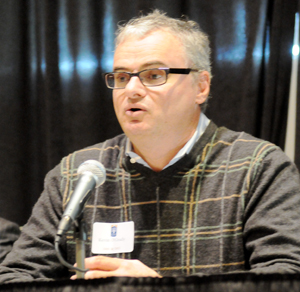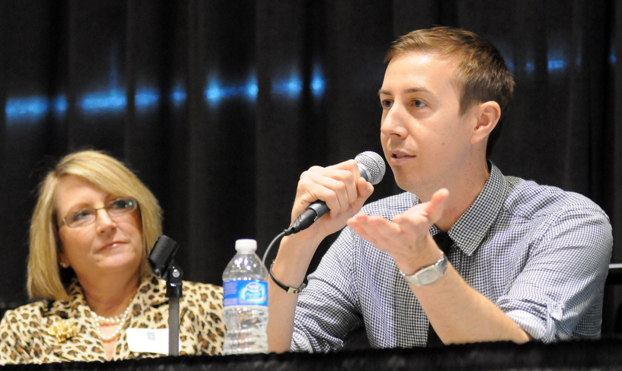 Caption: Attorney Linda Bauermeister, left, looks on as fellow CSUF alumnus and talk show host John Phillips talks about his career. Photos by Mimi Ko Cruz
Caption: Attorney Linda Bauermeister, left, looks on as fellow CSUF alumnus and talk show host John Phillips talks about his career. Photos by Mimi Ko Cruz
Alumni Offer Advice
Graduates Featured at Pi Sigma Alpha Event
What would you take away from a college class? For Sean Joyce (B.A. political science ’86, M.P.A. ’93) , it was how his professors inspired him.
Now Irvine’s city manager, Joyce is just one alumnus who returned to campus March 1 to attend a luncheon sponsored by the campus chapter of Pi Sigma Alpha, the national political science honor society.
Joining Joyce in a panel discussion on career advice, were:
- attorney Linda Bauermeister (B.A. political science ’80), partner, Barber and Bauermeister;
- Michael Ingram (B.A. political science ’79, M.P.A. ’82), fraud division bureau chief, California Department of Insurance;
- Kevin O’Grady (B.A. political science ’90, M.A. political science ’93), regional director, Anti-Defamation League, Orange County and Long Beach region; and
- John A. Phillips (B.A. political science ’02), host of “The John Phillips Show” on KABC AM-790.
Margaret M. McCarthy (B.A. political science ’84), director of Paradigm Ventures, moderated the discussion.
The panelists shared their experiences after graduation and urged students to pursue master's degrees in order to excel in their chosen fields. In addition to attaining a graduate degree, Joyce said today’s students also should work to improve their writing and speaking skills.
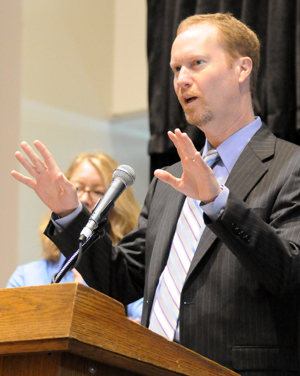 Caption: Irvine City Manager Sean Joyce told students that they should consider everything they do as an opportunity to distinguish themselves.
Caption: Irvine City Manager Sean Joyce told students that they should consider everything they do as an opportunity to distinguish themselves.
“Writing and speaking skills are very important,” he said. “I was so inspired by my professors here at Cal State Fullerton. They made me want to be smarter.”
Joyce told students that once they complete their education and start looking for a job or to advance in a job, they should consider everything they do as “an opportunity to distinguish themselves.
“Don't worry about the clock and office politics,” he said. “Every day is an opportunity to impress, to learn, to grow.”
Excerpts from the panel discussion, featuring Ingram and Bauermeister, are available on YouTube.
The following is a transcript of Ingram’s talk:
Since I was a kid, I wanted to be a cop, and a lot of you in this room probably don’t remember an old show called “The F.B.I.” and its band of nicely dressed good guys against the bad guys.
I was glued to the TV watching that, and I wanted to do that and go out and make a difference, and for me, making the difference was putting the bad guys in jail so they wouldn’t hurt other people. So, throughout junior high and high school, I read everything I could about law enforcement and, specifically, the FBI, but it didn’t work out that way.
But, when I came to Cal State Fullerton, I was intent on going to law school, and political science had that pre-law program, so I thought it was a great degree for me to get into because I would have a great understanding of the political process, the legislative process, and the executive and judicial process and, I will be out enforcing laws that will be derived from these processes, and I wanted to have an understanding of the government in general.
While I was here at Cal State, I met some folks who worked in law enforcement, I took the exams and while I was finishing up my M.P.A. in 1981, I started working in alcohol and vice, and later on went to fraud division working on high-end and multimillion-dollar criminal and fraud cases.
Today, if I want to get hired, I have to have a degree in criminal justice. Many of you are probably in that concentration right now. However, back then, I had just enough units in the criminal justice program to qualify for the exam.
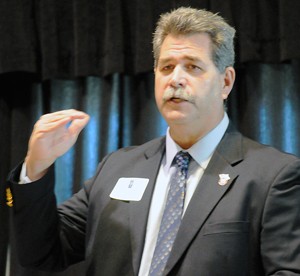 Caption: Michael Ingram talked about how he rose through the ranks to become bureau chief in the fraud division of the California Department of Insurance.
Caption: Michael Ingram talked about how he rose through the ranks to become bureau chief in the fraud division of the California Department of Insurance.
As I rose through my rank, the knowledge I gained through political science and public administration helped me with unions, employee relations, budgeting, just dealing with people and understanding the processes, and dealing with legislatures on bills, and supporting or not supporting and understanding of political process. What a great deal it was to reflect back on my time at Cal State and some of the resources I had.
How can I help someone today?
I highly recommend the greatest job I can imagine to have. The way the program is structured now — the criminal justice program is structured, embedded with the public administration program and political science program — is a great thing. So, you are doing great for yourself educationally.
A career in political science and criminal justice will serve you very well. Employers are looking for individuals with college degrees. To be a cop in California, all you need is a high school diploma, of course be 21 and meet other parameters but, educationally, it’s still a high school diploma.
Police departments, sheriff's departments and state law enforcement, of course, are now looking for individuals who have advanced themselves educationally. So, keep up with your field, and it will help you tremendously when you go for your job interview.
The following is a transcript of Bauermeister’s talk:
You’re coming at a significantly different time.
You can find jobs but, you are going to have to think out of the box. Work for a couple different law firms and I strongly suggest that you go into not one but multiple internship programs before you go to law school and during law school.
I only did one internship program during my sophomore year. There was a gentleman who was a D.A. and taught a child advocacy class. We went to D.A.s office. Cases to try. It was really the most valuable opportunity I ever had. It was very competitive. And, my first year at Loyola, I was amongst the top 10. I made it to court.
So, it really helped me in my sophomore year, getting into that child advocacy class. Without that class, I couldn’t do this internship and never get in a courtroom. Valuable opportunity.
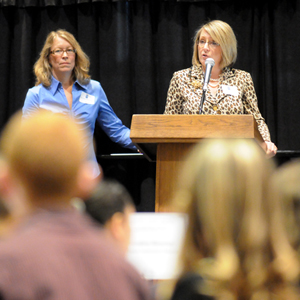 Caption: Linda Bauermeister, right, speaks as Margaret McCarthy, director of Paradigm Ventures, who moderated the Pi Sigma Alpha alumni panel discussion, looks on.
Caption: Linda Bauermeister, right, speaks as Margaret McCarthy, director of Paradigm Ventures, who moderated the Pi Sigma Alpha alumni panel discussion, looks on.
For all of you, there will be jobs, but you need to be selective about what law school you go to.
There will be so many attorneys out there. There were many layoffs, but there are also newer fields that weren’t around when I went to Loyola. I graduated from here in 1980 and from Loyola in 1983. The D.A.s office wanted me to stay with them, but I also liked the courtroom, but didn’t like not my clientele but what I was doing. Civil law firms. The last few months I was put in child sex crimes, and I have never had a worse job in my life, I couldn’t sleep, couldn’t eat, couldn’t think of anything except these children. It was a mind-opening opportunity but it was not something I wanted to do.
Having also worked at civil law firms from ’83-’89 I went out and got my clientele. I was at a civil law firm until 1989 and, in my mind, that’s what I wanted. My daughter was 6 months and I started my own law firm.
That’s an opportunity anybody can take.
Your class coming out needs to think out of the box but to a certain extent, you have been trained to do that from the beginning with MTV.
Create your own jobs, work for law firms and work with reputable attorneys and, then, decide what you want and what you want to make of your life. Don’t get stuck in the typical law-firm box.
Your life is yours. The average work life right now is 45 years, probably will be longer for all of you. You won’t be retiring at the same rates and ages like the rest of us will be able to do. Your work life expectancy may be 50 years.
Pick something you really enjoy and love if you’re going to be doing it for 50 years. Don’t settle for less. There is nothing worse than talking to someone who has been in the job for 30 or 40 years and is dragging themselves to work everyday.
You deserve better than that. You may be in a position where you have to create your own job so that it satisfies you and don’t look just at the money. Something that satisfies you. Take some jobs for the experience. The experience is worth so much. You can learn so much about yourself and what you want in life. You want more than just a career.
— Transcription by Muniba A. Siddiqui
March 10, 2011
